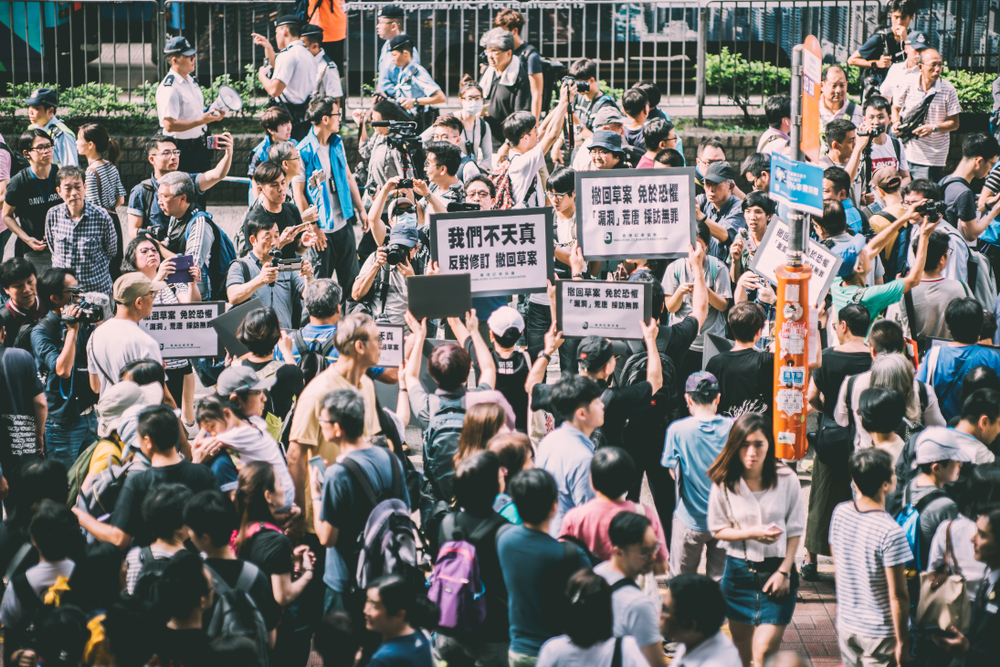
Hong Kong police warned Monday of the potential for protesters in the semi-autonomous Chinese territory to engage in violence “one step closer to terrorism” during this week’s National Day events, an assertion ridiculed by activists as propaganda meant to scare people from taking to the streets.
Police public relations chief Tse Chun-chung said police intelligence suggested hard-line protesters were inciting others to commit “extreme acts” such as killing police, posing as police officials to kill civilians, and large-scale arson including at gas stations during Tuesday’s holiday.
“We are on the verge of extreme danger,” Tse told a news conference. “There are apparent signs that hard-core violence may escalate. Those acts are one step closer to terrorism.”
Lawmaker Claudia Mo called the police intelligence “a joke,” saying the warning echoed one made by a Chinese government newspaper days earlier.
“This is Chinese propaganda at play,” she said. “What’s more worrying is that police have admitted to its officials masquerading as protesters. So who will be the arsonists? Who will be the murderers? The goal is to institute fear in society so that people will be scared to go out. This is a despicable tactic.”
Echoing that view was Bonnie Leung of the Civil Human Rights Front, which has organized several massive rallies in nearly four months of anti-government protests.
Violence erupted over the weekend in what has become a familiar cycle since protests began in June over a now-shelved extradition bill and have escalated into an anti-China movement. Many people view Beijing as chipping away at the autonomy and freedoms Hong Kong was promised when the former British colony returned to Chinese rule in 1997.
In Beijing, President Xi Jinping renewed his government’s commitment to allowing Hong Kong to manage its own affairs. At a reception on the eve of National Day, Xi pledged that China will abide by the “one country, two systems” framework to ensure Hong Kong will “prosper and progress” alongside the mainland.
Hong Kong authorities are looking to minimize violence on National Day that could embarrass Xi as his ruling Communist Party marks 70 years since taking power.
Amid a relative lull Monday, more than 1,000 students formed a long human chain at the harbour front at night to keep up the momentum while hundreds more gathered outside a subway station in the busy Mong Kok district, chanting slogans and belting out protest songs.
Civil Human Rights Front’s request for permission to hold a march Tuesday through the city centre was rejected by police. An appeals board on Monday upheld the ban. The group warned that denying a peaceful avenue for protesters could accelerate violence because citizens would turn up anyway, as they’ve done in the past when rallies were banned.
“Hong Kong is losing its freedom of speech and assembly. Hong Kong is becoming more and more like a police state, like a tyranny like Beijing,” Leung said.
Apart from the march, other rallies are planned in multiple locations Tuesday, with posters calling for Oct. 1 to be marked as “A Day of Grief.”
The government tightened security near a convention centre where a muted National Day reception will be held indoors Tuesday. The public will be barred from watching the flag-raising ceremony at a square outside the centre in the morning and an annual fireworks display has been cancelled.
Tse, the public relations chief, said violence escalated over the weekend, especially during a melee Sunday in the heart of the city’s business and shopping district that lasted late into the night.
He said protesters lobbed more than 100 gasoline bombs, set large street blazes and attacked police. In response, police fired water cannons and used 328 tear gas canisters and other projectiles to clear the crowd. He said one officer had to fire a bullet in the air after protesters surrounded him.
He said 157 people, aged between 12 and 53, were detained over the weekend. Local media reported more than two dozen people, including a foreign journalist, were injured.
Three people, including an actor and activist, were reportedly detained Monday over their participation in the protests. Police couldn’t immediately confirm this when contacted by The Associated Press.
Hong Kong Chief Executive Carrie Lam left earlier Monday with a delegation of 240 people to participate in National Day festivities in Beijing.
The protracted unrest has battered Hong Kong’s economy, with businesses suffering and tourism plunging.
Norman Chan, the outgoing chief of Hong Kong’s Monetary Authority, said earlier Monday that the city’s monetary and financial systems remained stable due to healthy buffers but warned the unrest is spooking investors.